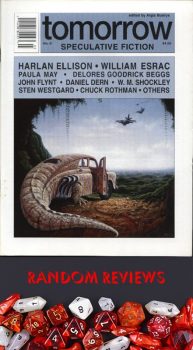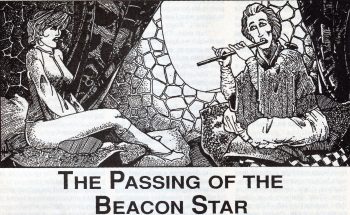Random Reviews: “The Passing of the Beacon Star” by Chuck Rothman

Chuck Rothman’s story “The Passing of the Beacon Star” appeared in the eighth issue of Tomorrow Speculative Fiction in April of 1994. Although it has a strong fantasy feel, the story is a science fiction tale, set on another planet in which the human settlers carry around insect-like jerritch on their shoulders.
The jerritch act as retainers of the human’s memories, so individuals have no long term memory. If they need to access details of something that has happened in the past, whether to them or to the world at large, their jerritch plugs its antenna into a port on the human’s neck and allows the person to access the memories they need. This allows each individual to essentially live a variety of lives without reference to their earlier existence and in the process they take on new names and identities.
The story is set in the city of Amak during a festival known as “Choosing Day.” On this date, the citizens of Amak not only choose their new identities, but also choose which House of Guidance, essentially a sect, will guide the city for the next year.
Rothman focuses on a woman who is using the name “Weaver of Colors.” Wandering through the crowded city aimlessly, she connects with her jerritch looking for a place to get away from the crowds. The jerritch leads her to the Cult of the Beacon Star, which is the current Guiding House for Amak. Unlikely to be selected again, the house is empty except for one of its Holies, the priest who oversees the sanctuary. Weaver and the priest learn, through their jerritches, that they were once lovers, and although their recollections are limited, they reconnect with each other until the votes are cast and the Cult of the Beacon Star is not longer the guiding light, at which time, Weaver learns more about herself from her jerritch.
This story is not very long, but Rothman packs a lot into it, both with his allusions to the history of the world as a settled planet (although it could just as easily have been a straight fantasy setting), the concept of the selected leadership, his exploration of memory and identity, and the concept of not remember a person’s own past, but using an off-sight storage system, the jerritches, which has a very contemporary feel given the modern reliance on cellphones and the internet.

Unfortunately, “The Passing of the Beacon Star” has a problem that is all too common in fantasy and science fiction. The author provides hints of a broader culture, but it doesn’t feel as if it has been fully fleshed out. The cool idea is there and provides the focus for the story, but if the reader takes a step back to see how the cool idea might fit into the world at large, it falls apart.
This is one of those story where the plot may not need more wordage to tell the story, but the worldbuilding certainly is more complex than Rothman was able to share in the limited length that he had. Expanding the story would have given him a chance to flesh out the world he had created, which has hints of complexity, as well as try to round out his characters, although given the limitations of their memory and their changing nature over time as they adopt new names and professions, that may have been a more difficult task.
The jerritches, however, demonstrate that even if there is no consistency among the individuals in their actions, thoughts, ethics, or identities, there can be a continuum of purpose across the different persona they adopt, which drives the story’s denouement.
 Steven H Silver is an eighteen-time Hugo Award nominee and was the publisher of the Hugo-nominated fanzine Argentus as well as the editor and publisher of ISFiC Press for 8 years. He has also edited books for DAW, NESFA Press, and ZNB. His most recent anthology is Alternate Peace and his novel After Hastings was published in 2020. Steven has chaired the first Midwest Construction, Windycon three times, and the SFWA Nebula Conference 6 times. He was programming chair for Chicon 2000 and Vice Chair of Chicon 7.
Steven H Silver is an eighteen-time Hugo Award nominee and was the publisher of the Hugo-nominated fanzine Argentus as well as the editor and publisher of ISFiC Press for 8 years. He has also edited books for DAW, NESFA Press, and ZNB. His most recent anthology is Alternate Peace and his novel After Hastings was published in 2020. Steven has chaired the first Midwest Construction, Windycon three times, and the SFWA Nebula Conference 6 times. He was programming chair for Chicon 2000 and Vice Chair of Chicon 7.